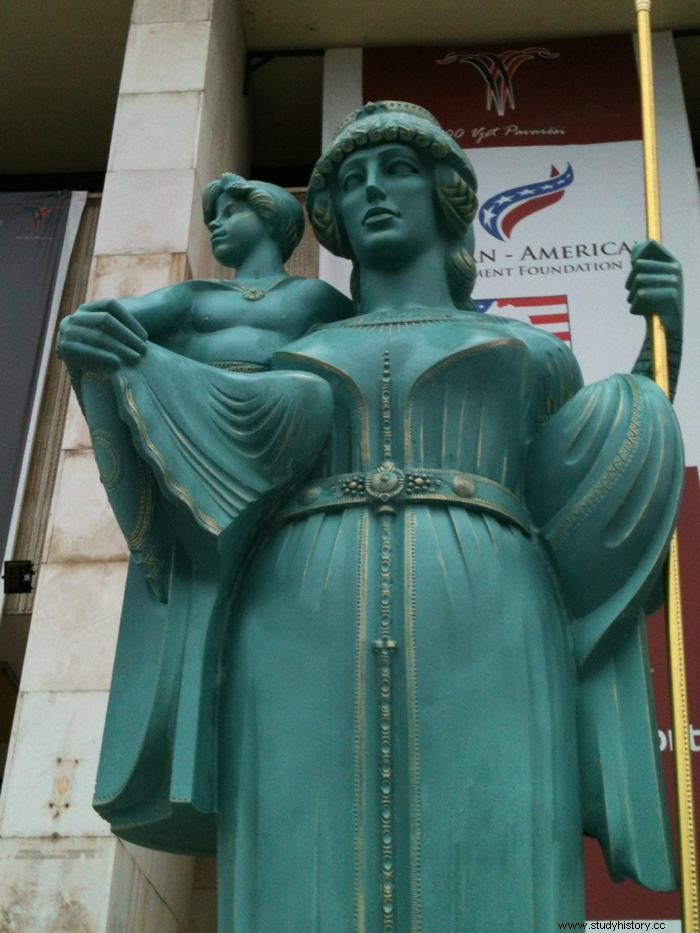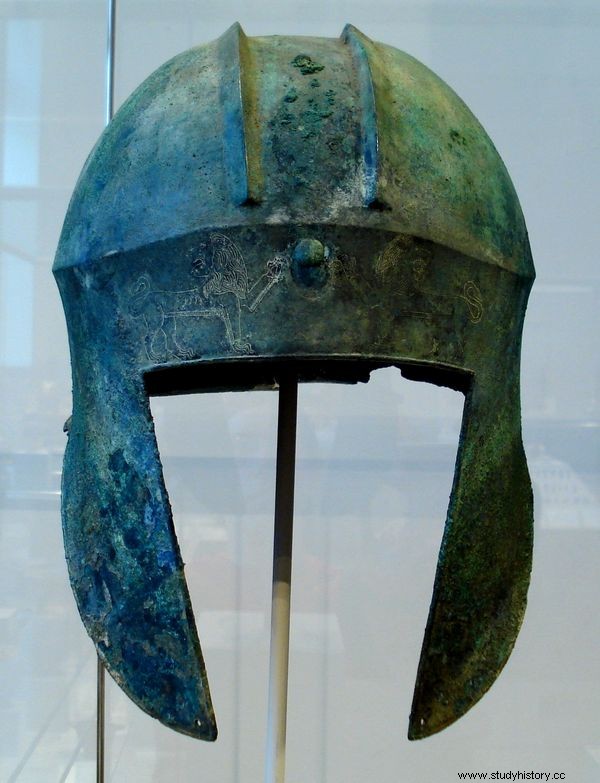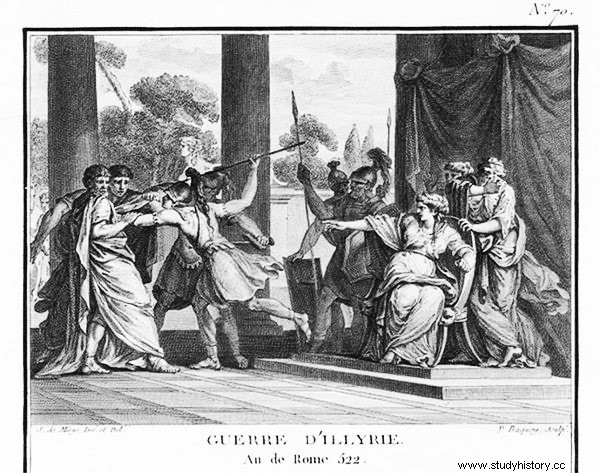Queen of the Illyrians in the 3rd century BC, Teuta controls one of the most powerful fleets in the Mediterranean. Her acts of piracy lead her to war against Rome.
Wife of Agron of Illyria

“Agron, king of Illyria, and son of Pleurate, had greater armies on land and sea than his predecessors ever had. » Polybius – General History, Book II.
Teuta is known to us in particular through the Stories of the Greek statesman and historian Polybius, who describes his story in chronicles imbued with the sexism of his time. Teuta is the second wife of Agron of Illyria, ruler of the Illyrian tribe of Ardiaei [English]. Settled in the Balkans, the Ardiaei established their capital at Scodra (present-day Shkodër in Albania) and possessed strongholds on the Adriatic coast, notably at Rhizon in the Bay of Kotor (in Montenegro).
According to the Greek geographer and historian Strabo, the Ardiaei are one of the most powerful Illyrian peoples, along with the Autariates and the Dardanis [English]. Agron, who reigns from around 250 to 231 / 230 BC, develops the power of his people and expands his borders and his power. Agron is particularly famous for his victory over the Aetolians, one of the main Greek powers. His kingdom, whose borders are not known with certainty, then includes a large part of Illyria.
Regent and pirate
"The kingdom passed into the hands of his wife Teuta, who entrusted the administration of affairs to her friends. This queen, following the habits of levity of her sex, thought only of the victory her subjects had just won. Without regard to neighboring states, she initially allowed her subjects to engage in piracy. Then, having equipped a fleet, and raised an army as numerous as the first, she exercised here and there, through her generals, all sorts of hostilities. » Polybius – General History, Book II.
On the death of Agron, the son he had with his first wife, Pinnes of Illyria, succeeded him with Teuta as regent. After the recent victories of the Illyrians, she reigns over a vast territory and aspires to continue the work of her husband. His troops launched a series of raids, quickly attacking coastal towns before retreating to Elis and Messenia (now Greece). They take the cities of Dyrrachium and Phœnicè, before being forced to retreat by the arrival of allies.
The Illyrians are active at sea as well as on land, intercepting and plundering merchant ships from Rome. Their piracy actions greatly disrupt trade and shipping in the Adriatic Sea, and Teuta expands the operations of its ships in the Ionian Sea. Building ships, she developed one of the most powerful fleets in the Mediterranean. Seizing boats making the connection between Greece and Italy, the Illyrians capture Roman citizens and reduce them to slavery. Quickly, the Roman Republic decides to act to protect its property and its citizens, and regain control of the Adriatic Sea.

The First Illyrian War
“It was then that the Roman ambassadors arrived. In the audience they were given, they complained of the wrongs their merchants had suffered at the hands of the Illyrian corsairs. (…) When they had finished, her answer was that she would try to prevent their Republic from having cause to complain of her kingdom in general; but that it was not the custom of the kings of Illyria to forbid their subjects to race for their own particular benefit. At this word fire went to the head of the youngest of the ambassadors, and with a freedom which only lacked having been taken opportunely:it is to avenge in common the wrongs done to individuals; and we will, please the gods, cause you soon to go of yourselves to reform the customs of the Illyrian kings. The queen took this answer as a woman, that is to say, in very bad part. » Polybius – General History, book II.
In -230, the Senate of Rome sends two ambassadors to Scodra to meet Teuta there, ask for an end to acts of piracy and demand reparations. One of them would have disrespected the queen; in retaliation, Teuta orders their capture, the seizure of their ship, and the death of whoever insulted him. Rome sees in it a declaration of war; the following year, the assembly of centuriate comitia voted for war. This is the beginning of the first Illyrian war.

A fleet of 200 ships, carrying 20,000 soldiers and 2,000 cavalry, sailed to Corcyra (present-day Corfu in Greece) and Epidamnus (present-day Durrës in Albania). Allied with the Epirotes and the Arcanians, Teuta launches an expedition to meet the enemy army. His troops fail at Epidamne but manage to bring down Corcyra. It is Demetrios of Pharos who commands Corcyra, but the Romans besiege him and he ends up delivering the city before serving as a guide to the Romans. The Roman army finally besieges Scodra, and Teuta, defeated, takes refuge behind the walls of Rhizon from where she seeks peace.
The Treaty of Defeat
“When spring came, there came to Rome ambassadors from Teuta, who, in the name of their mistress, proposed these conditions of peace:she would pay the tribute which had been imposed on her; that, with the exception of a few places, she would cede all Illyria, and what was of more importance, especially in relation to the Greeks, that beyond the Lisse she could put on sea only two unarmed brigantines. » Polybius – General History, book II.
Rome takes advantage of its military victory to impose severe conditions on the peace treaty. Teuta is thus forced to liberate the conquered Greek and Dalmatian cities, to pay an annual tribute and to navigate in a reduced territory. These conditions accepted, Teuta remains at the head of a weakened kingdom. Nothing is known of the rest of his existence.
“The Romans pushed this people from the sea inland because of their piracy, and forced them to cultivate the land. But as the terrain was too rough and too barren to suffice for the needs of men who occupied themselves only with agriculture, this people was destroyed and almost disappeared. Strabo, Book VII.
Useful links
Polybius – General History, Book II
Teuta Wikipedia page
